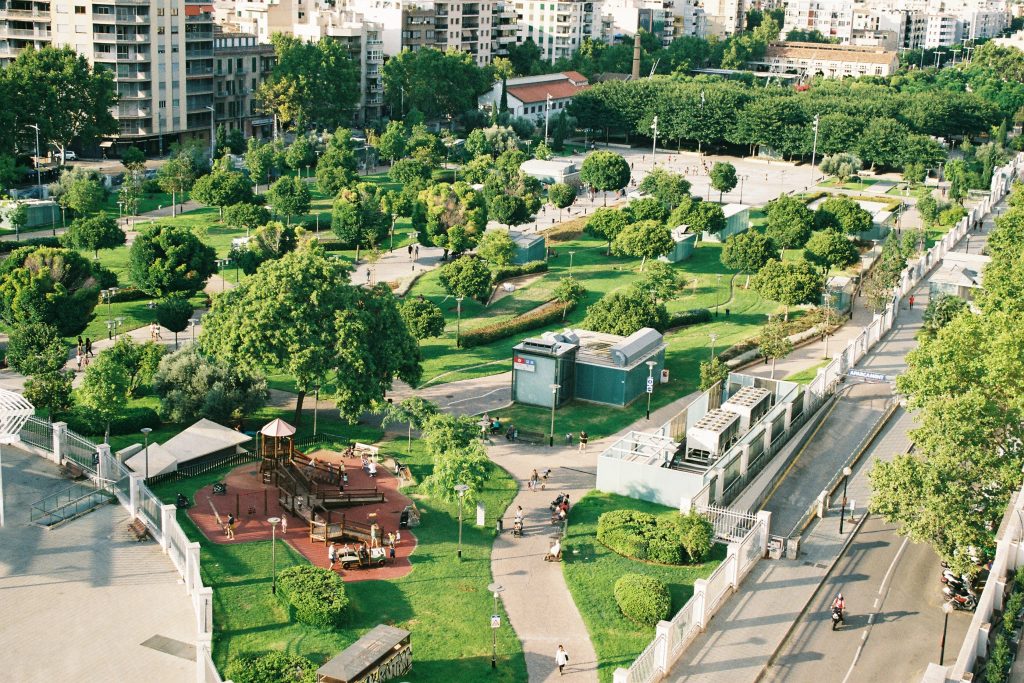In a 15-minute city, all services and amenities should be accessible within a 15-20 minute walk or cycle from a person’s dwelling. Cars are not needed to go to shops, to work, to the gym or to the GP. The overall aim is to improve the sense of community, reduce pollution and carbon emissions, and increase health and fitness. A number of UK councils have proposed the development of 15-minute cities, including Oxford, Sheffield, Bristol, and Canterbury. Planning reforms in Scotland also propose 20-minute neighbourhoods.
15-minute cities are not a new idea and have been successfully implemented in various urban centres around the world. With their clear social and environmental benefits, they have re-emerged as a tool to help us attain Net Zero and sustainability goals. Compact and resource-efficient cities, with proximity of residences and jobs, mixed land use and good access to public transportation, can help cut urban emissions by around 25%, according to the Intergovernmental Panel on Climate Change (IPCC).
But, there appears to be some fear-mongering afoot about what exactly a 15-minute city entails and how it would work. Some opposing parties claim they are an attempt to stop people from using their cars at all or from going anywhere further than 15-minutes away. Others see the focus on keeping it local as a form of “climate lockdown”, adversely affecting personal freedoms.
Looking specifically at proposals in Oxford, which have triggered recent social media debate, Oxford City Council’s statement said that no resident would need “permission” to travel across the city:
“Under the traffic filters, residents will still be able to drive to every part of the city at any time – but in the future, at the times when the filters are operating, you may need to take a different route (e.g. using the ring road) if you want to travel by car. Exemptions to fines would be provided to “carers, blue badge holders, businesses, and emergency services”.
For people who are seriously concerned about climate change and air pollution, the culture war backlash directed at this urban planning concept has been very worrying. On Twitter, proposals for these amenity rich areas have been described as ghettos and even concentration camps.
The truth is that 15-minute cities aim to provide their citizens with multiple optional benefits; they will not need to use their cars, they may be incentivised not to, but car use will not be denied. If a proportion of the population feel trapped and threatened by this focus on local facilities and incentivisation of clean transport, then we have to wonder how they will react when climate policy gets really serious. We are already seeing supermarkets rationing fresh vegetables and academic research is being conducted into rationing at national level of the amount of carbon people may be permitted to use in future.
The sooner we act to achieve sustainability, the less impactful choices and adjustments we have to make to our lifestyles. The longer we delay, deny or block, the more likely that adaptations will ultimately be severe and sudden.
The same principle applies to our finances. Adjusting and aligning them to a low carbon economy reduces the risk of future shocks, both within our own investments and in the wider financial system. To be honest, it is quite a bit easier to adjust our pension and investment portfolios than it is to change travel, heating and dietary habits.
It’ll not take 15 minutes, that’s for sure, but you will get a sustainable wealth plan tailored to your personal objectives, with investment choices to match. No car travel required!
Contact me here to find out more: www.somersetwm.co.uk/call
15-minute cities: how to separate the reality from the conspiracy theory (theconversation.com)
Liveable Neighbourhoods for Bristol (liveablebristol.org.uk)
Photo by Nerea Martí Sesarino on Unsplash




